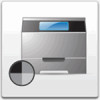Lexmark Monochrome Laser Complete Printer Reference (1.7 MB) - Page 154
Resident fonts, pany's LaserJet 4050.
 |
View all Lexmark Monochrome Laser manuals
Add to My Manuals
Save this manual to your list of manuals |
Page 154 highlights
Scalable fonts (also called outline fonts) are stored as computer programs that define the outlines of the characters in the font. Each time you print characters from a scalable font, the printer creates a bitmap of the characters at the point size you choose and saves it temporarily in printer memory. These temporary bitmapped fonts are deleted when you turn off or reset the printer. Scalable fonts provide the flexibility of printing in many different point sizes. Your printer uses different scalable font formats for downloading fonts to the printer. PCL 6 emulation uses Intellifont and TrueType scalable fonts. PostScript 3 emulation uses Type 1 and TrueType scalable fonts. There are thousands of different scalable fonts available in these different font formats from numerous font suppliers. If you plan to use many downloadable bitmapped or scalable fonts or if you plan to use many different sizes of scalable fonts, you may need to purchase additional memory for your printer. Resident fonts Your printer is equipped with resident fonts stored permanently in printer memory. Different fonts are available in PCL 6 and PostScript 3 emulations. Some of the most popular typefaces, like Courier and Times New Roman, are available for all printer languages. The following tables list all the fonts resident in your printer. See page 163 for instructions on how to print samples of the fonts. You can select the resident fonts from your software application, or from the operator panel if you are using PCL 6 emulation. Support for the euro currency character is included in all applicable fonts for both PostScript and PCL emulations. Twelve of the PCL symbol sets support the euro character including all seven Windows symbol sets. Both PostScript and PCL emulations have forward and backward compatibility modes. The forward compatibility mode is used to emulate the fonts in the Hewlett-Packard Company's LaserJet 4050. The backward compatibility mode is used for compatibility with the Lexmark Optra S family of printers. Refer to the Technical Reference for more information about backward and forward compatibility. Understanding fonts 154















